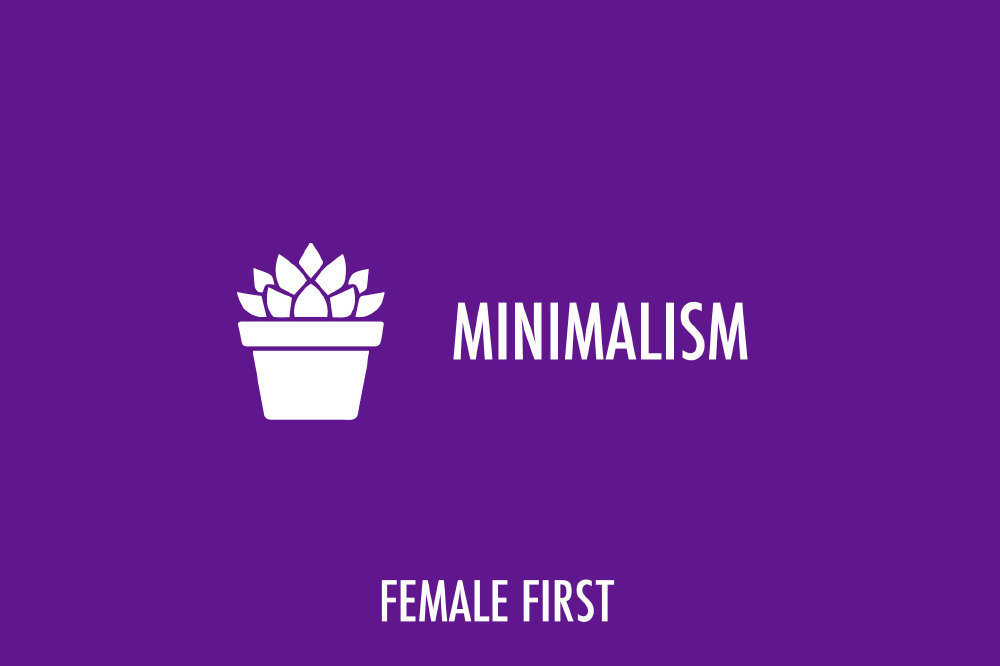When we marked a year since the first lockdown on the 24th March, it was a time for reflection and indeed- still is. We asked ourselves questions such as- what worked in our favour? What are the things we’d rather forget? And what do we want to take forward into the future with us? For minimalists old and new- it had a significant impact on the way we approached our physical things, here’s why.

Credit: Khalid Hawe/Zuma Press/PA Images
We were suddenly confronted with all our stuff: When we were forced to spend more time at home, there was no escaping our belongings. Existing minimalists probably fared well during this time, but aspiring simple livers, may have felt overwhelmed at not being able to walk away from their things. This forced many people to declutter even if they weren’t ready or didn't really want to- it was a matter of feeling at peace in their homes again- and most of the time this means having less stuff. Minimalists were born during lockdown whether they intended to be or not.
Charity shops feared overwhelm: Stories were released towards the end of the restrictions on the subject of charities and their concerns about the sheer amount of things they were expecting to receive once they opened their stores again. And they were right, a local charity of mine began taking donations again but every person was limited to one bag. Another planned to take items in for a whole month and put a stop to it just a couple of weeks in because they had reached maximum capacity in their store rooms. The proof was in the pudding, when people were afforded more time- they wanted their homes to be in order.
People discovered minimalist shows and documentaries: With little else to do other than watch what was on offer on popular streaming services- people found the joys of Marie Kondo’s Tidying Up, The Home Edit and Less Is Now on Netflix while other fan favourites such as Hoarders were available to stream on Amazon Prime. This inspired people all over the world to declutter, organise and rethink their relationship with their things.
Experiences eclipsed things: With so many people out of work or on reduced wages, most had to make their own forms of entertainment, which paved the way for more experiences and eliminated the need for physical items. Taking walks with family, having picnics in the back garden, drawing rainbows to display in windows, baking, enjoying the things that they already had such as old board games and reigniting long forgotten hobbies were commonplace. Experiences became the order of the day because money was tight.
Experiences could be made free or cost very little: People discovered that maybe they preferred a movie night at home with a bottle of soda, a blanket and some own brand popcorn with their family rather than spending a fortune on cinema tickets. That eating a home cooked meal or having a BBQ was far more satisfying than getting in a greasy take-away or shelling out for a restaurant offering. Families were able to do things on a dime that they had once spent most of their budget on when they had time together pre-lockdown.
More time for reading: Once people had exhausted all the books on their ‘to read’ pile, they looked for new genres and some stumbled across the huge array of books on minimalism. A new-found interest in authors celebrating a life with less were forged- especially towards the festive season when Have Yourself A Minimalist Christmas by Meg Nordmann hit the virtual shelves in September which encouraged a totally new approach to the end of year celebrations.

Entrepreneurial spirit: With many suddenly out of work, people had to get creative with how to make money and some decided to start their own YouTube channel. Decluttering and minimalism were an obvious content choice because activities such as The Minimalists' 30 Day Minimalism Game could be done from the comfort of their own home. Ashlynne Eaton shared how she was let go from her job on the same day she reached 100,000 subscribers meaning she could move to content creation full time. People had to think outside the box and exit their comfort zones which encouraged more inspirational minimalist influencers.
Lockdown had it’s faults, that goes without saying- but for the minimalist movement, many positives emerged amidst the restrictions that were imposed upon us. It’s vital that we focus on these and leave the negativity, regrets and bad feelings behind in a bid to declutter our minds as well as our things.
RELATED: Minimalism: Old stuff you can get rid of today
Today is National Old Stuff Day, a 24 hours period for an out with the old mentality, but not necessarily in with the new if you are following a minimalist lifestyle. If you are aspiring to live more simply, you will probably have more old stuff to get rid of, so if you’re struggling in your journey here are some suggestions on where to begin...

Tagged in Minimalism Minimalist Lockdown

